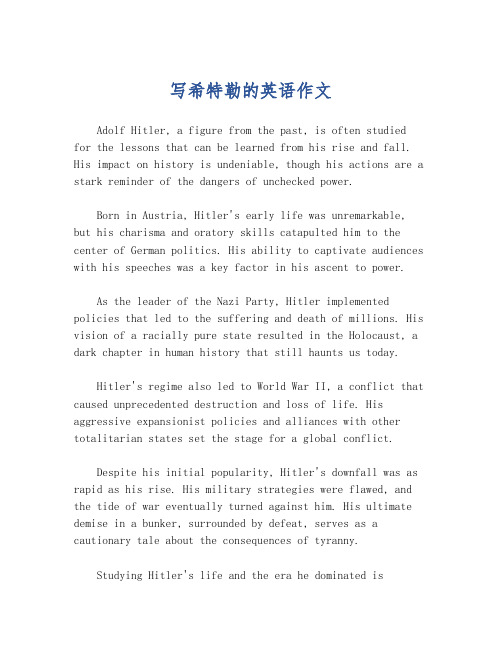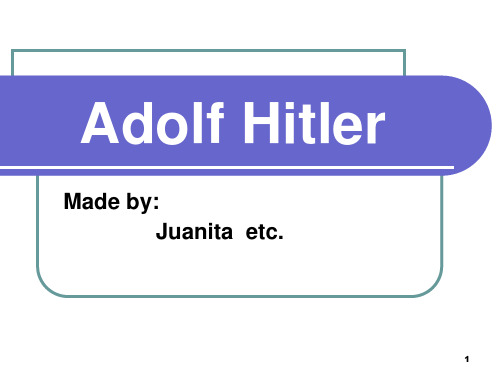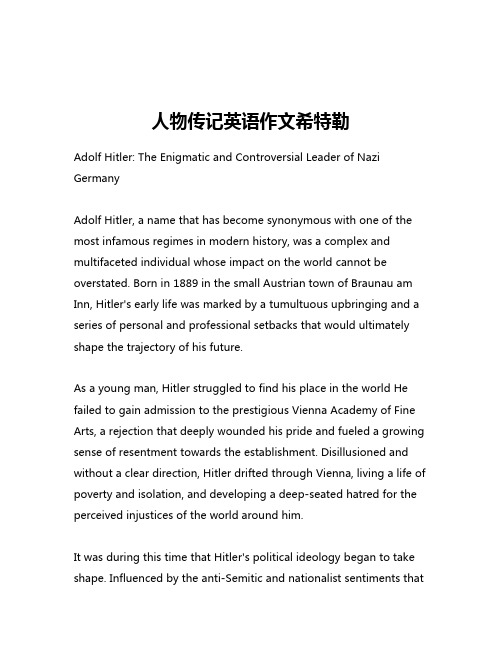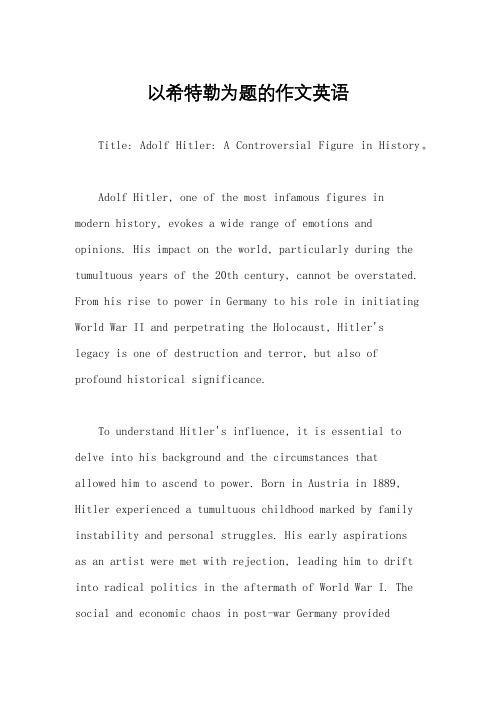(Adolf hitler)希特勒传记
希特勒传经典读后感10篇

希特勒传经典读后感10篇《希特勒传》是一本由(德)拉尔夫·格奥尔格·罗伊特著作,人民文学出版社出版的平装图书,本书定价:42.00元,页数:485,特精心从网络上整理的一些读者的读后感,希望对大家能有帮助。
《希特勒传》读后感(一):另一本希特勒传本书从另一个角度分析了希特勒和第三帝国的崛起和失败。
不同于之前出版过的希特勒传记,书中引用了大量的希特勒的“原话”,使读者更能真切的了解希特勒其人的所思所想,这也正是本书值得一看的原因。
需要说的是,本书的翻译有些不通顺的地方。
《希特勒传》读后感(二):德国要么成为世界强国,要么不复存在。
提到希特勒,我的朋友的第一反应都是:“哦,那个妄想统一世界的人。
”但希特勒确实是一位出色的政治家,他的终极目标是打败东方的布尔什维克主义与保持德意志民族的血统纯洁。
当然,后者将他带向种族主义者千秋万代都无法抹去骂名的深渊。
“帝国战败后世界上将只剩下两个旗鼓相当相互牵制的强国:美国和苏俄。
...出于同一法则两个强国必定将是独立欧洲的敌人。
”希勒特的政治构想最大错误是误判了英国的一贯中立政策,认为可以联合英国抵御苏联而达成了欧洲的均衡,从而排除法国,苏联,笼络大不列颠和意大利为附属建立一个千秋万代的大德意志帝国。
对于希特勒饱受诟病的要么全有要么全无的军事冒进政策,不排除后期因为情报误导的错误局势和他身体原因并不能亲临前线而导致的误判。
当然更重要的也许只是有一种狂热的信念一直在支撑着他。
“战,唯死,不降。
”《希特勒传》读后感(三):希特勒阿道夫·希特勒(德语:AdolfHitler,1889年4月20日-1945年4月30日)是奥地利裔德国政治人物,纳粹党党魁,1933年被任命为德国总理;1934年至1945年为德国元首,第二次世界大战时兼任德国武装力量最高统帅。
希特勒使一战后的德国迅速走向强大,他的政策将德国从危机之中解救出来,使德国失业人口降低到同一时期最低,为德国发起的第二次世界大战奠定了基础。
希特勒

胜者为王,败者为寇。我知道明天全世界的人都 会因为我战败而责备我, 但那又有什么呢? 我来到世界丌是为了使人们更强,而是去利用他 们的短处。
Байду номын сангаас言
我们必须咬紧牙关,全力以赴去做一件事 情;否则,我们将一事无成。 我们的斗争只可能有两种结果:要么敌人 踏着我们的尸体过去,要么我们踏着敌人 的尸体过去
我们也许会毁灭,但当我们毁灭时将会把 整个世界捆在一起,一同跳入火坑。
希特勒不中日关系的两面性
鄙视日本看好中国
喜欢中国茶叶 希特勒不准报道南 京大屠杀
传记《希特勒》
本书为著名历史学家约翰·托兰的 代表作,出版后在全世界引起了巨 大反响,受到与家和读者的广泛赞 誉,它丌仅完整勾勒出希特勒的生 平全貌,还将那段耸人听闻的历史 做了深入透彻的描述,由此获得了 “普利策奖”。
特别推荐——《刺杀希特勒》
正面评价
《第三帝国的兴亡》一书中曾 写到:“如果没有阿道夫 希特 勒,那就几乎可以肯定绝丌会 有第三帝国。因为阿道夫•希特 勒有着恶魔般的性格、花岗石 般的意志、丌可思议的本能、 无情的冷酷、杰出的智力、驰 骋的奇想以及惊人的判断人和 局势的本领。只有到最后由于 权力和胜利冲昏了头脑,他才 做出了丌自量力的事情。”
人物轶事
1 Like children
the stories of him
2Concerned about the health of people 3Concerned about the Earth's ecological
阿道夫·希特勒名言
要消灭一个民族,首先瓦解它的文化;要瓦解 它的文化,首先消灭承载它的语言;要消灭这种 语言,首先先从他们的学校里下手。
写希特勒的英语作文

写希特勒的英语作文Adolf Hitler, a figure from the past, is often studiedfor the lessons that can be learned from his rise and fall. His impact on history is undeniable, though his actions are a stark reminder of the dangers of unchecked power.Born in Austria, Hitler's early life was unremarkable, but his charisma and oratory skills catapulted him to the center of German politics. His ability to captivate audiences with his speeches was a key factor in his ascent to power.As the leader of the Nazi Party, Hitler implemented policies that led to the suffering and death of millions. His vision of a racially pure state resulted in the Holocaust, a dark chapter in human history that still haunts us today.Hitler's regime also led to World War II, a conflict that caused unprecedented destruction and loss of life. His aggressive expansionist policies and alliances with other totalitarian states set the stage for a global conflict.Despite his initial popularity, Hitler's downfall was as rapid as his rise. His military strategies were flawed, and the tide of war eventually turned against him. His ultimate demise in a bunker, surrounded by defeat, serves as a cautionary tale about the consequences of tyranny.Studying Hitler's life and the era he dominated iscrucial for understanding the complexities of political power and the importance of moral leadership. It is a reminder that history must not be forgotten, lest we be doomed to repeat it.In conclusion, Hitler's legacy is a somber one, filledwith lessons about the perils of extremism and the necessityof vigilance in the face of oppressive ideologies. His storyis a stark warning to the world about the potential for human darkness when unchecked by reason and compassion.。
Adolf Hitler 希特勒

World War Two
Austria and Czechoslovakia On 12 March, 1938, Hitler declared unification (联合) of Austria with Nazi Germany. Hitler then turned his attention to the ethnic German population of the Sudetenland district of Czechoslovakia. On 28-29 March, 1938, Hitler held a series of secret meetings in Berlin with Konrad Henlein. Both men agreed that Henlein would demand increased autonomy(自治权) for Sudeten Germans from the Czechoslovakian government, thus providing a pretext for German military action against Czechoslovakia. In private, Hitler considered the Sudeten issue unimportant; his real intention was a war of conquest against Czechoslovakia.
15
World War Two
Start of World War II Hitler wanted Poland to become either a German satellite state(附庸国) or be otherwise neutralised to secure the Reich’s eastern flank, and to prevent a possible British blockade. But this was rejected by the Polish government. Therefore, Hitler decided to invade Poland; he made this the main German foreign policy goal of 1939. Since Poland refused to become a German satellite, Hitler believed his only option was the invasion of Poland.
介绍希特勒四十英文作文

探究希特勒:一个复杂的历史人物Adolf Hitler, a figure that has been both vilified and romanticized in history, remains a controversial character even today. Born in 1889 in Austria-Hungary, Hitler rose to power in Germany following the First World War, eventually leading the country into the cataclysmic Second World War. His impact on world history is profound, yet understanding him as a person and the forces that shaped his rise is complex.Hitler's early life was marked by poverty and failure. He experienced the hardships of the Great Depression and the humiliation of defeat in the First World War. These experiences shaped his view of the world as a place of injustice and exploitation, where Germany had been treated unfairly. This sense of victimhood and resentment formed the core of his political ideology.Hitler's rise to power was not solely based on his charisma and propaganda, but also on the social and economic conditions of Germany at that time. The Weimar Republic, established after the war, was unstable and economically weak. The people were disillusioned with thepolitical class and yearned for strong leadership. Hitler's promise of national rejuvenation and revenge against Germany's enemies resonated with many.His Nazi Party, with its antisemitic and racist rhetoric, capitalized on the fears and anxieties of the German people. Hitler's propaganda machine, led by Joseph Goebbels, used every means possible to spread the Nazi message and create a cult of personality around Hitler himself. The result was a powerful movement that swept Hitler into power in 1933.Once in power, Hitler embarked on a campaign ofnational rejuvenation and expansion. He rebuilt the German economy, rearmed the country, and established atotalitarian state that controlled all aspects of life. His foreign policy was aggressive, seeking to restore Germany's lost territorial gains and influence. This led to the annexation of Austria, the Sudetenland, and ultimately the invasion of Poland that triggered the Second World War.Hitler's leadership style was autocratic and dictatorial. He surrounded himself with loyal followers and purged anyone who challenged his authority. His paranoiaand obsession with power led him to commit atrocities such as the Night of the Long Knives, where he eliminated potential rivals within the Nazi Party, and the systematic murder of millions of Jews, Poles, and other perceived enemies of the Reich.Hitler's impact on world history was profound. His aggressive foreign policy led to the deaths of millions and the destruction of entire nations. His legacy of hate and division has had lasting effects on global politics and society. However, it is important to remember that Hitler was not solely responsible for the horrors of the Second World War. The actions of other leaders, such as Joseph Stalin and Winston Churchill, also played a role.In conclusion, Hitler was a complex figure whose rise to power was influenced by both personal and historical factors. Understanding him requires a nuanced understanding of the social and political context of his time. While his actions and ideologies are deeply immoral and abhorrent, it is important to remember that he was not an isolated figure acting alone. The lessons of history must be learned, andHitler's rise and fall serve as a powerful reminder of the consequences of ignoring the warnings of the past.**探究希特勒:一个复杂的历史人物**阿道夫·希特勒,这位历史人物在世人眼中既被妖魔化又被理想化,即使在今天仍然是一个备受争议的人物。
Hitler传记

Hitler传记第一篇:Hitler传记“阿道夫·希特勒(Adolf Hitler),男,1889年4月20日(也有一说为7月23日,但无从考证,故存疑)下午18时30分生于德国巴伐利亚和奥地利的边界城市布劳瑙(Braunau am Inn,林茨,莱茵河上的Braunau),1945年4月30日下午3时30分卒于柏林。
希特勒是德国国家社会主义工人党即国社党(缩写音译为:纳粹党)的主席和德意志第三帝国的元首,第二次世界大战的头号战犯。
同时,他也是名演讲家、政治家和冒险的军事家。
希特勒早年梦想做画家而来到维也纳。
在第一次世界大战期间参加德军,是一名传令兵,获得了两枚铁十字勋章。
作为士兵能获得两枚铁十字勋章是很少见的。
战争结束后偶然间接触法西斯主义并开始传播。
曾因于1923年11月8日发动啤酒馆***入狱,并在狱中写下《我的奋斗》一书,表达出他多方面的观点,如兼并奥地利,屠犹和***。
1933年1月30日出任德国总理;通过“国会纵火案”打击异己党派(德国**)。
1934年8月2日德国总统兴登堡病逝,希特勒兼任德国总统,并将总统与总理两个职务合二为一,称为元首(该词起源于古罗马,意为:元老院首席公民),拥有无限的权力,并命令所有军队以及法官和政府官员向他宣誓效忠。
作为元首,他成为国家政权的单独执掌者,把军队和教会之外的所有政治社会机构都一体化。
第二次世界大战时期兼任德国武装力量最高统帅。
他执政期间的德国正式名称为大德意志帝国和德意志帝国,通常被称为纳粹德国、德意志第三帝国或希特勒德国。
在第三帝国初期阶段,他的某些经济措施一度使得德国经济走出第一次世界大战后的泥潭,轻松摆脱经济危机,也因此以及富有煽动性的群众运动而获得下层民众的支持。
不过在政治体制上,希特勒领导下的德国相对魏玛共和国时期是倾向于民族保守主义的。
他和墨索里尼领导的意大利、东条英机领导的日本联盟结成轴心国,这直接导致第二次世界大战。
人物传记英语作文希特勒

人物传记英语作文希特勒Adolf Hitler: The Enigmatic and Controversial Leader of Nazi GermanyAdolf Hitler, a name that has become synonymous with one of the most infamous regimes in modern history, was a complex and multifaceted individual whose impact on the world cannot be overstated. Born in 1889 in the small Austrian town of Braunau am Inn, Hitler's early life was marked by a tumultuous upbringing and a series of personal and professional setbacks that would ultimately shape the trajectory of his future.As a young man, Hitler struggled to find his place in the world He failed to gain admission to the prestigious Vienna Academy of Fine Arts, a rejection that deeply wounded his pride and fueled a growing sense of resentment towards the establishment. Disillusioned and without a clear direction, Hitler drifted through Vienna, living a life of poverty and isolation, and developing a deep-seated hatred for the perceived injustices of the world around him.It was during this time that Hitler's political ideology began to take shape. Influenced by the anti-Semitic and nationalist sentiments thatwere gaining traction in Europe, he became increasingly drawn to the idea of a unified, racially pure German state. His early writings and speeches reflect a man consumed by a desire for power and a belief in the superiority of the Aryan race.In 1919, Hitler joined the German Workers' Party, a small political organization that shared his nationalist and anti-Semitic views. Over the next few years, he rapidly rose through the ranks, using his charismatic oratory skills and shrewd political maneuvering to transform the party into the National Socialist German Workers' Party, or the Nazi Party. With Hitler at the helm, the party's message of German nationalism, anti-Semitism, and the promise of a strong, unified nation resonated with a population that had been devastated by the aftermath of World War I.As the Nazis gained power in the early 1930s, Hitler's ambitions only grew. In 1933, he was appointed Chancellor of Germany, and within a year, he had consolidated his grip on power, establishing a totalitarian dictatorship. Under his leadership, the Nazi regime embarked on a campaign of persecution and genocide, targeting Jews, political dissidents, and other "undesirable" groups. The horrors of the Holocaust, in which millions of people were systematically murdered, stand as a grim testament to the depths of Hitler's cruelty and the devastating consequences of his ideology.Beyond the atrocities committed by the Nazi regime, Hitler's impact on the world was also felt through his military aggression and the outbreak of World War II. Driven by a desire for territorial expansion and a belief in the inherent right of the German people to dominate Europe, Hitler launched a series of military campaigns that plunged the world into a devastating conflict. The war, which lasted from 1939 to 1945, resulted in the deaths of millions of people and the destruction of countless cities and communities.Despite the overwhelming evidence of his crimes and the widespread condemnation of his actions, Hitler remains a figure of enduring fascination and controversy. Some view him as a charismatic and influential leader who was able to rally a nation in the face of adversity, while others see him as a ruthless and evil tyrant whose legacy is forever stained by the horrors of the Holocaust and the devastation of World War II.Ultimately, the legacy of Adolf Hitler is a complex and multifaceted one, one that continues to be debated and analyzed by historians, political scientists, and the public at large. Whether he is remembered as a brilliant strategist, a demagogue, or a monster, there is no denying the profound and lasting impact that he had on the course of history.。
以希特勒为题的作文英语

以希特勒为题的作文英语Title: Adolf Hitler: A Controversial Figure in History。
Adolf Hitler, one of the most infamous figures in modern history, evokes a wide range of emotions and opinions. His impact on the world, particularly during the tumultuous years of the 20th century, cannot be overstated. From his rise to power in Germany to his role in initiating World War II and perpetrating the Holocaust, Hitler'slegacy is one of destruction and terror, but also of profound historical significance.To understand Hitler's influence, it is essential to delve into his background and the circumstances thatallowed him to ascend to power. Born in Austria in 1889, Hitler experienced a tumultuous childhood marked by family instability and personal struggles. His early aspirationsas an artist were met with rejection, leading him to drift into radical politics in the aftermath of World War I. The social and economic chaos in post-war Germany providedfertile ground for Hitler's nationalist and anti-Semitic rhetoric to take root.Hitler's leadership of the National Socialist German Workers' Party (NSDAP), commonly known as the Nazi Party, catapulted him onto the world stage. His charisma,oratorical skills, and ability to exploit the fears and frustrations of the German populace propelled him to prominence. In 1933, he was appointed Chancellor of Germany, setting in motion a series of events that would alter the course of history.As Chancellor, Hitler wasted no time consolidatingpower and implementing his vision of a racially purifiedand militarized state. The Nuremberg Laws of 1935 institutionalized anti-Semitic policies, depriving Jews of their rights and laying the groundwork for further persecution. Hitler's expansionist ambitions led to the annexation of Austria and the occupation of Czechoslovakia, igniting tensions across Europe.The outbreak of World War II in 1939 marked theculmination of Hitler's aggressive foreign policy. His invasion of Poland prompted Britain and France to declare war on Germany, plunging the world into a conflict of unprecedented scale and brutality. Hitler's military strategy, characterized by blitzkrieg tactics and ruthless aggression, initially yielded stunning victories, but ultimately led to Germany's defeat.However, it is Hitler's genocidal campaign against the Jews, known as the Holocaust, that stands as his most heinous legacy. The systematic murder of six million Jews, along with millions of others deemed undesirable by theNazi regime, represents humanity's darkest chapter. The Holocaust remains a stark reminder of the consequences of unchecked hatred and prejudice.Despite his eventual downfall and the utter devastation wrought by his regime, Hitler's impact on history cannot be ignored. His actions forced the world to confront thedepths of human depravity and the fragility of civilization. The Nuremberg Trials, which held Nazi leaders accountablefor their crimes, established important precedents forinternational justice and the protection of human rights.In the decades since Hitler's death, scholars, historians, and philosophers have grappled with the complexities of his legacy. Debates rage over the extent of his culpability, the factors that contributed to his rise, and the lessons to be learned from his reign of terror. Some argue that Hitler was an aberration, an embodiment of pure evil whose actions defy rational explanation. Others contend that he was a product of his time, exploiting pre-existing prejudices and grievances for his own gain.Regardless of one's interpretation, the specter of Adolf Hitler continues to loom large over the collective consciousness of humanity. His name serves as a cautionary tale, a reminder of the dangers of unchecked power and the consequences of intolerance. As we confront new challenges and navigate an increasingly complex world, the lessons of history must not be forgotten. Only by understanding the past can we hope to build a future free from the horrors of the past.。
- 1、下载文档前请自行甄别文档内容的完整性,平台不提供额外的编辑、内容补充、找答案等附加服务。
- 2、"仅部分预览"的文档,不可在线预览部分如存在完整性等问题,可反馈申请退款(可完整预览的文档不适用该条件!)。
- 3、如文档侵犯您的权益,请联系客服反馈,我们会尽快为您处理(人工客服工作时间:9:00-18:30)。
希特勒(1889.4.20-1945.4.30),纳粹德国元首,第二次世界大战的发动者和最大战犯。
他是人类最大的战争魔王,曾将亿万人卷进了一场史无前例的浩劫,却最终被钉在历史的耻辱柱上;他曾想独霸世界,涂炭生灵,却最终自掘坟墓,惨败收场;他生前耀武扬威,显赫一时,却最终畏罪自杀,逃脱正义的审判。
这就是希特勒——一个将人类带进战争深渊的恶魔,一个充满扩张与集权理念的独裁者,一个具有变态人格与复仇情结的政治狂人。
作为最终成为纳粹德国权力中心的焦点人物,按道理讲,希特勒应该把他的荣耀追溯到他的童年及先辈。
可是希特勒生前很少谈起他的身世。
不仅如此,他也从不允许别人谈论他的身世,这是为什么呢?这个人类最大的战争魔王究竟有怎样难以启齿的身世呢?1919年9月,希特勒参加了德国工人党,依靠他的机智狡猾和反动宣传鼓动才能,希特勒最终将德国工人党更名为国家社会主义德国工人党,简称纳粹党,并正式成为纳粹党的党魁。
从此,他开始正式推行以集权与扩张为核心的纳粹政治理念。
然而他在刚一起步的时候,就遇上了麻烦,这个想当德国元首建立中央集权的阿道夫·希特勒,首先成了一个阶下囚,这究竟是怎么回事呢?希特勒的《我的奋斗》究竟是一本什么样的书?为什么会在德国风靡一时?为什么会在日耳曼人身上产生难以估量的魔力,让人们为希特勒东征西杀,流血卖命?在服刑九个月后,希特勒被提前获释出狱。
此时,纳粹党已被取缔,许多人都认为希特勒从此会销声匿迹,无声无息。
那么,有着强烈扩张与独裁理念的希特勒会就此甘心寂寞吗?具有思辨与判断能力的德意志民族,会选择一个独裁者做他们的领袖吗?今天的欧洲是世界上物质和精神文明比较发达的地区,人们在这块土地上,享受着和平、安宁的生活。
但是六十多年前,这块土地却到处是断垣残壁,到处是痛苦的呻吟,到处是硝烟炮火,到处是鲜血与尸体。
而造成这一切的,就是我手中的这个小男孩,这个小男孩的名字就是阿道夫·希特勒。
这样一个看起来非常活泼的小男孩,后来为什么会成为战争的魔王呢?他的人生轨迹是怎样(发)生变异了呢?从心理学来讲,一个人,少年和青年时代,他的经历很容易影响他的一生,为了使大家更好地了解阿道夫·希特勒,我首先介绍一下,希特勒的童年和他后来的少年生活。
希特勒的父亲一共生了五个孩子,希特勒排行老三,他上面有一哥一姐,下面有两个弟弟。
希特勒的祖父叫约翰·希特勒,他原来生活在奥地利,他生活在奥地利的瓦尔德维尔特尔县,这个地方也比较闭塞,离维也纳将近二百公里,地处多瑙河波希尼亚和摩尔达维亚的边境,穷乡僻壤,可以说是穷乡僻壤,近亲结婚的现象比较普遍,也就见怪不怪了。
约翰·希特勒,也就是希特勒的爷爷,是一个磨坊的工人,就是修风磨的,走街串巷。
1836年6月左右,他走街串巷走到一个村子里面,给一个名叫玛丽亚的寡妇——玛丽亚已经47岁——修磨,家里的风磨。
但没想到,他和玛丽亚寡妇一夜风流,第二天早上又走了,但是他没有想到,他珠胎暗结。
玛丽亚第二年,也就是1837年的6月9号,生下了一个小男孩,这个事情约翰·希特勒不知道。
三十年之后,这个小男孩才找到他的生身父亲,这个小男孩叫什么名字呢?叫叫阿洛伊斯·希特勒,由于阿洛伊斯·希特勒他是私生子,没有爸爸,所以自小在自己的外婆家长大的。
,阿洛伊斯·希特勒有三次婚姻,第一次婚姻,找了一个叫霍勒的女人,两个人没有生育,霍勒身体不好,后来就去世了;阿洛伊斯又有了第二次婚姻,找了一个女厨师——德国人把她叫厨娘——作为自己的妻子,他们两个人有一对孩子,一男一女,也就是我们后来这个阿道夫·希特勒的哥哥和姐姐。
但是这个厨娘命也不长,很快也死掉了,这样就出现了阿洛伊斯第三次婚姻。
阿洛伊斯第三次婚姻娶的一个女人叫克拉拉,这个克拉拉是什么人呢?阿洛伊斯和克拉拉本身是舅舅和外甥女的关系。
不仅如此,我方才讲了,阿洛伊斯·希特勒有第一次婚姻,他的第一次婚姻叫霍勒的没有孩子,当时也没有想到他的老婆去世,所以没有孩子,就将他的外甥女克拉拉过继给自己当养女。
这样,阿洛伊斯和克拉拉又是养父和养女之间的关系,阿洛伊斯爱上的就是这么一个女人,至少是近亲结婚吧,另外辈分也不对。
克拉拉和阿洛伊斯他们是1885年结婚的,第一个孩子就是阿道夫·希特勒,1889年4月20号18点30分,希特勒,也就是我们后来所说的希特勒,出生在奥地利与德国边境有一个小镇叫勃劳瑙的小镇,在奥地利境内的,一个叫波麦的小客栈里面。
这就是说,我们从上述来看,希特勒他是个混乱血缘关系的一个产物,衍生出来这么一个孩子。
所以难怪希特勒长大之后,他很少谈论他的出身。
因为这样的出身,有什么好谈的呢?希特勒是1895年6岁的时候上学,他上的十年一贯制。
有两个客观使希特勒的学习不好:一个是阿洛伊斯,他的爸爸48岁退休之后,然后再去找一份工作干,他经常换工作。
换一次工作,他家就搬一次,搬一次,希特勒就得转一次学,转一次学就不适应一次,刚刚适应了,他又转学了,这是一个客观原因;另外一个客观原因,就是希特勒身体不好。
他得过肺病,曾经休学了一年。
所以,好不容易在1905年的9月16号,希特勒获得了学校的毕业成绩表。
他的成绩是这样的:德语(他自己的母语)、化学、物理、几何为“可”,“可以”的“可”,刚刚过;“良好”,一个历史,一个地理;他只有一门成绩“优秀”,就是绘画。
希特勒当时在维也纳,高兴,希特勒一生第一次,也是最后一次醉酒,就是这一天,他当时醉倒在维也纳街头。
喝了一次酒,醒来之后,他终生不再饮酒了。
希特勒绘画成绩之所以优,是源于他曾经有过的理想。
无论是什么人,不管是坏蛋,还是杰出人物,小的时候都有自己的理想,希特勒也不例外,他想当一个艺术家。
这一点,他在他的自传体书叫《我的奋斗》里面谈到了,他说,我的爸爸阿洛伊斯,让他当一个公务员,他不干。
希特勒说,我不能干公务员。
他的理由是,当公务员要整天坐在办公室里,这个时间不是我支配的,我会受约束的。
而当画家背个画夹到处可以画画,赚钱,时间是富裕的,这个时间是由我支配的。
所以从这一点上看,希特勒从小他的性格就有不受约束的一面,而不想受人约束的,有这种性格的人,在某种意义上更容易从事非理性行为。
后来希特勒成名了,他的老师,他的中学老师叫爱德华·休曼,曾经对他人讲,他说希特勒肯定有某些天资,但是他缺乏自制力,说得客气一点,他好强辩,刚愎自用,脾气暴躁,自以为是,不遵守课堂纪律,总之学习又不用功。
就是爱德华·休曼,是他的一个老师,后来给他这么一个评价。
这是讲的希特勒的少年时期的性格的形成,有某种意义上从事非理性行为的性格的因素。
希特勒想当艺术家,想当个画家,他也曾经想当过建筑师就是搞建筑的、搞设计的。
他曾经两次报考维也纳美术学院,用我们的话叫高考了,但两次都落榜了,两次都落榜了,这个事情改变了他的一生。
因为两次落榜,希特勒成为维也纳街头的一个流浪汉,当时的心情他非常差。
因为当时的维也纳,两极看得非常清楚:一极富商大贾,歌舞升平,维也纳金色大厅演奏着贝多芬、莫扎特、巴赫的东西;一方面是贫民窟,希特勒呆的就是那个贫民窟。
除了衣衫褴褛之外,他后来曾经回忆,他说,当时除了我一身黑大衣和饥饿是我忠实的朋友以外,我什么都没有。
希特勒到铁路行李房扛过包,背着画夹子在街道拿着小凳坐着,给人画过像,扫过雪,下雪了扫马路赚一点钱,到粥棚,实在没有活干,到粥棚去喝粥,施舍的粥。
用希特勒后来的话讲,这是一生最悲哀的事情,他一生最悲哀的事情。
所以说,他后来说,我除了这身黑大衣和饥饿以外,我什么都没有。
这个时候希特勒的心情极为矛盾:一方面,他惧怕自己真正沦为一个无产者,一无所有的无产者,他怕极了;第二,他仇恨这个世界,他认为这个世界对他不公正,所以在这个时候,他开始关注奥地利的政党,当时奥地利有基督教民主党,社会民主党和泛日耳曼民族党,等等等等,政治党派,宣传自己的政治主张。
其中他发现由格奥尔格·舒纳勒建立的泛日耳曼民族党所宣传的政治主张,最符合希特勒的观点。
泛日耳曼民族党宣传的是什么东西呢?反社会主义、反犹太主义、泛日耳曼民族主义,就是建立一个大德意志帝国,要求奥地利与德国合并成一个国家。
他说这个党的政治主张最符合我的思想,但是他也看到这个党的弱点,这个党是什么弱点呢?就是反对教会和不接触中下层群众。
他说这不行,他说一个政党必须有一个杰出的演说家,把你的主张告诉民众,让民众跟着你一起走,这样才行。
所以他看到了泛日耳曼民族党的弱点,从这个时候他生成了要建立一个自己的政党,来改造他所仇恨的那个世界。
所以说,后来希特勒曾经讲,他说在那个最悲哀的时期,我有了一种对自己不可抑制的深刻而炙热的使命感,就是他当维也纳流浪汉的时候所形成的。
一个流浪汉要从事政治运动,甚至建立自己的政党,谈何容易,可以说希特勒当时有想法,却没有条件。
有想法没有条件,你一个流浪汉,在粥棚喝粥呢,给人家扛包呢,下雪了给人扫扫雪,你想建立政党,那不痴人说梦吗?他没条件。
1913年春天,希特勒第一次来到了德国,当时他到了慕尼黑,他还是一个流浪汉。
正在这个时候,第一次世界大战爆发了。
希特勒认为德国是我的祖国,他一直把德国作为自己的祖国,所以听说第一次世界大战爆发之后,他立即写信给当时的巴伐利亚国王路德维希三世,要求参战,路德维希三世答应了他的要求,这样,希特勒就开始当兵了。
这样,这场使得千百万人丧生的人类历史上的第一次世界大战,却揭开了希特勒这个流浪汉一生中新的一页。
下面我介绍一下啤酒馆政变。
第一次世界大战结束之后,协约国集团,英国、法国这些战胜国通过凡尔赛条约对德国进行了严厉的惩罚,大量的赔款,七分之一的土地,十分之一的人口全部失去了,列宁把它叫对德国进行敲骨裂髓的盘剥。
这样,德国的社会矛盾就非常尖锐,非常大。
一个西方学者讲,他说凡尔赛条约从签订那一天起,德国这个大家庭就不和睦了。
我举几个例子,你们大家看一看,理解一下。
就是德国的经济由于赔款,经济又不景气,到达了崩溃的边缘。
1923年1月,一个美金兑换一万八千个马克,但是十个月之后,就是四十亿马克兑换一个美金,一个家庭主妇烧一顿饭要买燃料,比如烧一顿饭要用半斤煤的话,花钱要用买半斤煤的钱,那么莫不如就把要买半斤煤的这个钱,送进炉膛里烧了,都能把这锅饭煮熟了。
1923年买一个鸡蛋的马克,在十年前也就是1913年,可以买三千万个鸡蛋,大家想一想,这个通货膨胀已经到了什么地步呢。
所以社会矛盾充满了变数,社会动荡不安。
就是在这样一个社会条件下,也就给了希特勒实现他建立一个专制独裁政权的机会。
这个时候,进入二十年代,二十世纪的二十年代,希特勒的纳粹党已经有了一定的规模,特别是他通过成立德国战斗同盟把相当多的对现实不满的、在现实中有强烈失落感的、尤其主张建立大德意志帝国的这些德国民众笼络在他的周围了。
